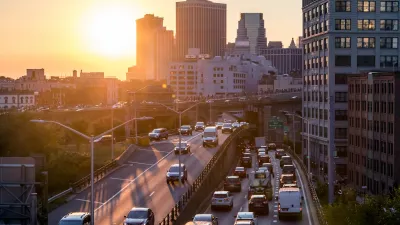The program would be the first cordon pricing scheme in the United States.

The U.S. Department of Transportation approved environmental reviews for New York City’s congestion pricing plan, clearing one of the city’s biggest obstacles to implementing the program.
As Daniel C. Vock explains in Route Fifty, the program, also known as cordon pricing, could raise up to $1 billion per year, much of which would go toward funding the city’s transit system. “The cordoned-off area would include all of Manhattan south of 60th Street. Tolls are expected to be between $9 and $23 per vehicle, but local officials have not yet decided the rate.”
Supporters of congestion pricing say the plan would boost public transit funding, improving service for transit commuters, and reduce congestion on roads, improving commutes for drivers.
While no other U.S. city uses congestion pricing yet, the practice has shown positive results in London, Stockholm, and other international cities. “Tiffany-Ann Taylor, vice president for transportation at the Regional Plan Association (RPA), said the effects on downtown streets should be quick to see once the tolling plan is put into place, even if it takes a few years for physical improvements to the subway system to take shape.”
Some local politicians are wary of the plan, saying it penalizes New Jersey workers who commute into the city. Taylor counters the claim, saying that “The fact of the matter is the folks who are commuting to New Jersey are mostly coming in through public transit … Folks who live in New Jersey and other parts of the region actually are benefiting directly from the program.”
FULL STORY: Congestion Pricing in Manhattan Clears Federal Hurdle

Planetizen Federal Action Tracker
A weekly monitor of how Trump’s orders and actions are impacting planners and planning in America.

Congressman Proposes Bill to Rename DC Metro “Trump Train”
The Make Autorail Great Again Act would withhold federal funding to the system until the Washington Metropolitan Area Transit Authority (WMATA), rebrands as the Washington Metropolitan Authority for Greater Access (WMAGA).

DARTSpace Platform Streamlines Dallas TOD Application Process
The Dallas transit agency hopes a shorter permitting timeline will boost transit-oriented development around rail stations.

Renters Now Outnumber Homeowners in Over 200 US Suburbs
High housing costs in city centers and the new-found flexibility offered by remote work are pushing more renters to suburban areas.

The Tiny, Adorable $7,000 Car Turning Japan Onto EVs
The single seat Mibot charges from a regular plug as quickly as an iPad, and is about half the price of an average EV.

Supreme Court Ruling in Pipeline Case Guts Federal Environmental Law
The decision limits the scope of a federal law that mandates extensive environmental impact reviews of energy, infrastructure, and transportation projects.
Urban Design for Planners 1: Software Tools
This six-course series explores essential urban design concepts using open source software and equips planners with the tools they need to participate fully in the urban design process.
Planning for Universal Design
Learn the tools for implementing Universal Design in planning regulations.
Municipality of Princeton
Roanoke Valley-Alleghany Regional Commission
City of Mt Shasta
City of Camden Redevelopment Agency
City of Astoria
Transportation Research & Education Center (TREC) at Portland State University
US High Speed Rail Association
City of Camden Redevelopment Agency
Municipality of Princeton (NJ)





























